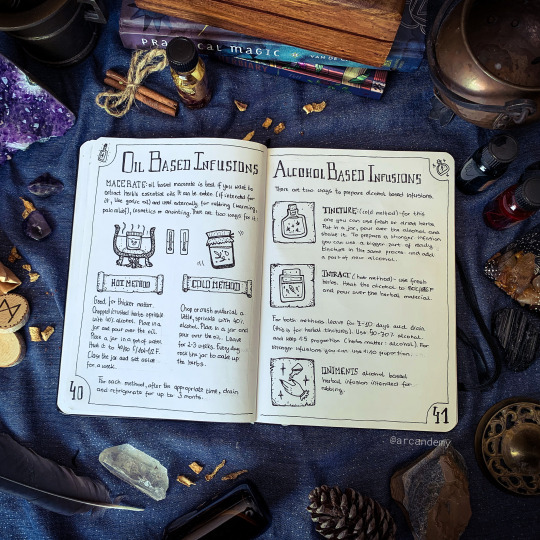#herbal potion

For more go and checkout my Instagram.
Oil Based Infusions
Macerate - oil based macerate is best if you want to extract herb’s essential oils. It can be eaten (if intended for this, like garlic oil) and used externally for rubbing (warming, pain relief), cosmetics or anointing. There are two ways for oil macerate:
- “Hot method” - good for thicker matter. Chopped/crushed matter sprinkle with 40% alcohol (it helps the oil work with the herb). Place in a jar and pour over the oil. Place the jar in a pot of water, heat it to 40-50 C/ 104-122 F. Close the jar and set aside for about a week.
- “Cold method” - Chop or crush the material a little, sprinkle with 40% alcohol (it helps the oil work with the herb). Place in a jar and pour over the oil. Leave for 2-3 weeks. Every day, rock the jar to wake up the herbs.
For each method, after the appropriate time, drain and refrigerate for up to 3 months.
Enfleurage - the oldest method of obtaining essential oils. It’s hard to do it at home without special equipment. A good quality oil must be called an essential oil (it is nautical) and not a fragrance oil (synthetic). To make sure it’s best to check the composition, it should be short, preferably the essential oil itself. You can use them for aromatherapy, add them to cosmetics and ointments, and include them in spells.
Salve - also known as ointment, for external application. To prepare you need base oils (like Argan, Avocado or Jojoba oils, Coconut or Shea Butter). Melt it with beeswax and essential oils. You can also infuse base oil first with any herbal matter for specific purposes.
Alcohol Based Infusions
There are two ways to prepare stronger alcohol based infusions:
- Tincture (cold method) - for this one you can use fresh or dried herbs. Put in a jar, pour over the alcohol and shake it. To prepare a stronger infusion you can use a bigger part of ready tincture in the same process and add a part of new alcohol.
- Intract (hot method) - use fresh herbs. Heat the alcohol to 80 C/ 176 F and pour over the herbal material.
For both methods leave for 7-10 days and drain (this is for herbal tinctures). Use 40-70% alcohol and keep 1:5 proportion (herbal matter : alcohol). For stronger infusion you can use 1:10 proportion.
Liniments- alcohol based herbal infusion intended for rubbing.

For more go and check myInstagram.
Infusion - is the process of extracting medicinal or flavor compounds contained in herbs in water, oil or alcohol, by leaving it over time. The temperature of the solvent and the time of leaving the herbal matter may vary depending on the extract’s strength, purpose and properties of the material.
Water Based Infusions
Herbal tea / tisane - obtained during the process called steeping (in a water based case it’s pouring boiling water over the matter and leaving it for several minutes). Best for fragile herbal material (like dried leaves and flowers), gives the weakest extract.Decoction - resultant of boiling herbal or plant material. Best for stems, roots and bark (for example willow bark or dried elderberries). Gives a little bit stronger extract.
Macerate - herbs are put in a jar and poured with cold water and left for several hours, at the end you can make a water bath (put the jar in a pot, watch out for the bottom, do not boil). Best for herbs containing mucus like linden.
Tonic - can be prepared from tea, decoction or macerate. Usually for external use for skin care, so you can add argan oil, vitamin E or a few drops of essential oil. To preserve for a bit longer use add a teaspoon of vinegar or alcohol (be careful with the latest as it is for your skin).
Inhalation - vapor from an infusion. For example in case of sinus problems or coughing, you can add essential oils to the hot water and inhale.
